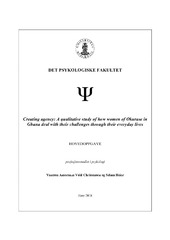| dc.contributor.author | Heier, Selma | |
| dc.contributor.author | Christensen, Vanessa Amorenza Vold | |
| dc.date.accessioned | 2019-01-30T11:49:50Z | |
| dc.date.available | 2019-01-30T11:49:50Z | |
| dc.date.issued | 2018 | |
| dc.date.submitted | 2019-01-29T23:00:04Z | |
| dc.identifier.uri | https://hdl.handle.net/1956/19025 | |
| dc.description.abstract | This thesis aims to explore how women living under constraining life conditions deal with their challenges through their everyday life. In order to obtain this knowledge, we conducted semi-structured interviews with eight women living in a rural village in Ghana, who all experienced hardships. The interviews were inspired by the Life Mode Interview (Haavind, 1987), where the women’s everyday lives served as a starting point for exploring their experiences and to understand their challenges and how they dealt with them. The analysis of the interviews was conducted by drawing on thematic analysis as suggested by Braun and Clark (2006; 2013) and using concepts and perspectives from Cultural psychology. Detailed reading of the empirical material in light of theory made us aware of the women’s agency, and we generated three themes that show how the women dealt with challenges; the importance of working, the importance of others, and the importance of hope. Working, although their work days were often very tough, provided the women with opportunity to be independent of others, to be able to provide for themselves, as well as family members. The importance of others was evident in how the women often made use of help and support from family and friends to cope with challenges. The women used their religious faith and imagined a better future as ways of influencing how they experienced their possibilities of change. The analysis shows different ways the women understood and made sense of their situation that contributed to create agency. Although their social and material circumstances restricted them, the women were nevertheless able to find ways of handling the challenges they were facing, and to keep an active role in influencing their lives. | en_US |
| dc.description.abstract | I denne hovedoppgaven utforsker vi hvordan kvinner som lever under begrensende livsbetingelser håndterer utfordringer i sine hverdagsliv. For å få kunnskap om dette har vi gjennomført semistrukturerte intervjuer med åtte kvinner fra en landsby i Ghana, som alle hadde store livsutfordringer. Intervjuene var inspirert av Livsformsintervjuet (Haavind, 1987), hvor kvinnenes hverdagsliv brukes som utgangspunkt for å utforske deres opplevelser, og for å forstå deres utfordringer og hvordan de håndterte dem. I analysearbeidet trakk vi veksler på tematisk analyse som foreslått av Braun og Clark (2006; 2013) og kulturpsykologiske perspektiver. Gjennom detaljert lesning av det empiriske materialet i lys av teori som gjorde oss oppmerksomme på kvinnenes agens, har vi generert tre tema som belyser hvordan kvinnene håndterer utfordringer de står overfor i hverdagen; betydningen av arbeid, betydningen av andre og betydningen av håp. Selv om kvinnenes arbeidsdager var veldig tøffe, ga arbeid kvinnene mulighet til å være uavhengig av andre, og til å forsørge seg selv og sine familiemedlemmer. Betydningen av andre viste seg gjennom hvordan kvinnene ofte benyttet seg av hjelp og støtte fra familie og venner for å håndtere utfordringer. Kvinnene brukte sin religiøse tro og forestilte seg en bedre fremtid som måter til å påvirke sin opplevelse av mulighet for endring. Analysen viser at hvordan kvinnene forstod og ga mening til sin situasjon bidro til å skape agens. Selv om deres sosiale- og materielle omstendigheter satte begrensninger for hvordan de kunne leve sine liv, fant kvinnene likevel måter å håndtere utfordringene de står overfor og bevare en aktiv rolle i å påvirke sine egne liv. | en_US |
| dc.language.iso | eng | eng |
| dc.publisher | The University of Bergen | eng |
| dc.subject | Agency | eng |
| dc.subject | qualitative research | eng |
| dc.subject | Ghana | eng |
| dc.subject | cultural psychology | eng |
| dc.subject | social constructionism | eng |
| dc.subject | Life Mode Interview | eng |
| dc.subject | women | eng |
| dc.title | Creating agency: A qualitative study of how women of Okurase in Ghana deal with their challenges through their everyday lives | eng |
| dc.type | Master thesis | |
| dc.date.updated | 2019-01-29T23:00:04Z | |
| dc.rights.holder | Copyright the Author. All rights reserved | eng |
| dc.description.degree | Hovedoppgave psykologprogrammet | |
| dc.description.localcode | PROPSY317 | |
| dc.description.localcode | PRPSYK | |
| dc.subject.nus | 736102 | eng |
| fs.subjectcode | PROPSY317 | |
| fs.unitcode | 17-0-0 | |
